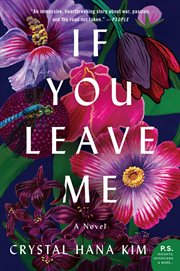Review by Booklist Review
*Starred Review* Hunger, both physical and emotional, haunts the lives of the extended Lee-Yun family during the tumultuous, violent decades that define modern South Korea in the latter twentieth century. Haemi and Kyunghwan are childhood playmates in the final years of Japan's brutal colonization, then become desperate, hard-drinking refugee teens in the midst of falling in love when the country is cleaved in two, only to regretfully separate in the final years of the Korean War. To satisfy her family's needs for food, respect, and status, Haemi marries Kyunghwan's second cousin, Jisoo, and seems to lose them both to the conflagration. Jisoo, damaged but alive, returns to Haemi to join her survivalist mother and her sickly younger brother. Through postwar industrialization, political upheaval, and civilian protests, Haemi struggles with loss after loss, giving birth to four daughters, falling more and more into despair with each. Her inevitable reunion with Kyunghwan sets in motion unavoidable devastation. New York born, Columbia MFA-holding Kim won a PEN/Robert J. Dau Short Story Prize for Emerging Writers in 2017 for Solee, part of an interconnected story collection that became this, her debut novel. Kim renders her multivoiced, multilayered ancestral and cultural history into stupendous testimony and indelible storytelling.--Terry Hong Copyright 2018 Booklist
From Booklist, Copyright (c) American Library Association. Used with permission.
Review by Publisher's Weekly Review
A family struggles to balance tradition and change in Kim's marvelous debut. Sixteen years old and living in a refugee camp in 1951 Busan, South Korea, Lee Haemi is not interested in marrying but knows the plight of her situation might necessitate it. War has put everything on hold except starving, dying, and desperation. Her decision to find a husband-borne partially out of hope for finding help for her ailing little brother, Hyunki-ripples through the lives of those around her, especially the cousins who compete for her affections: quiet, studious Yun Kyunghwan and loyal, clever Yun Jisoo. Kyunghwan and Jisoo are both conscripted and go off to war, where the former is injured and the latter becomes inured to the staggering violence and cruelty he witnesses. After the fighting, Jisoo asks Haemi to marry him, and she agrees, feeling he is the best option to guarantee the safety of her family. After they move to a small town and start a family of their own, Kyunghwan tries to get into college and fails; instead, he lands several demeaning jobs before eventually working his way up the ladder through a series of factory jobs. In a crucible of political upheaval, modernization, and tumultuous love, Haemi is faced with choosing between safety and her own passions when Kyunghwan reenters her life. Kim's lyrical intergenerational saga resonates deeply and will appeal to readers who enjoyed The Orphan Master's Son. (Aug.) © Copyright PWxyz, LLC. All rights reserved.
(c) Copyright PWxyz, LLC. All rights reserved
Review by Library Journal Review
DEBUT This first novel opens in 1951 Korea, where readers first encounter 16-year-old Haemi in a refugee camp with her widowed mother and brother after Communist-backed troops from the north invade her hometown. Initially depicted as a strong-willed young woman, Haemi dresses as a boy to traipse off during late-night hours with childhood friend Kyunghwan, with whom she's in a budding romance. When Haemi consents to helping her family by marrying Kyunghwan's wealthier cousin Jisoo, Kyunghwan learns to suppress his feelings and come to terms with the loss of his first love. Up to the year 1967, the narrative follows these three in alternating chapters as they deal with the trauma of war and mature through life. Things take a turn halfway through when Haemi and Kyunghwan reunite in Jisoo's home, with Haemi now the mother of three daughters and the wife of an unfaithful husband. Verdict Readers who enjoy novels by Jamie Ford and Lisa See will surely appreciate Kim's first work. Filled with brave personalities of all ages and character-driven story lines that are emotionally gripping, this sensitive and hauntingly written novel will easily leave readers wanting more. [See Prepub Alert, 2/11/18.]-Shirley Quan, Orange Cty. P.L., Santa Ana, CA © Copyright 2018. Library Journals LLC, a wholly owned subsidiary of Media Source, Inc. No redistribution permitted.
(c) Copyright Library Journals LLC, a wholly owned subsidiary of Media Source, Inc. No redistribution permitted.
Review by Kirkus Book Review
In this debut novel, a love triangle is complicated by temperament, circumstance, and history: Korea, 1951-1967. We meet Haemi Lee at 16, in a refugee camp. The war between North and South has forced what is left of her familyher mother and her invalid younger brotherfrom their village. In her boredom, she's begun going out at night with a boy named Kyunghwanthey ride a bicycle into town and find ways to drink makgeolli and have some fun. The problem is that by day, she's being courted by this boy's wealthier, orphaned cousin, Jisoo. Jisoo wants to marry Haemi before he enlists, mainly so that he can have the sense that there's a family waiting for him at home when he returns. Haemi's decision plays out over the next 16 years, a time of great upheaval in the lives of all Koreans. The perspective on the action is split among five first-person narratorsthe three already mentioned, Haemi's younger brother, and one of her daughtersand leaps over years at a time. This both expands the scope of the story and muffles its emotional power. Most interesting is the character of Haemi, who knows something is wrong with her, something that manifests as irritability, dissatisfaction, impulsivity, and an inability to connect deeply with those closest to her. In a world without diagnoses, therapists, or antidepressants, she will face a challenge even greater than the romantic onebecoming a mother. The character of Haemi is fascinating, her predicament a kind of Korean Virginia Woolf situation. Though this bulky saga is not as compelling as it could be, Kim's portrayal of the effects of mental illness on a family at a psychologically nave time is perceptive and moving. Copyright Kirkus Reviews, used with permission.
Copyright (c) Kirkus Reviews, used with permission.


